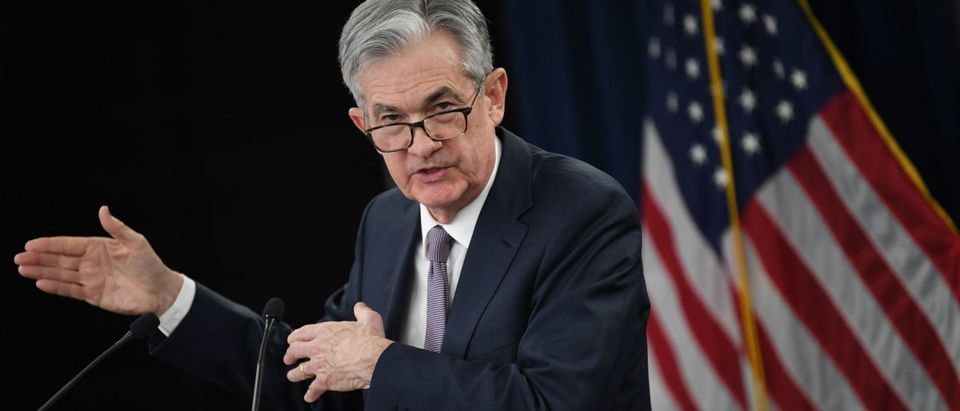Editor’s note: This article has been updated.
According to the Federal Reserve, the White House, and the media, the U.S. inflation mess, or, as President Joe Biden likes to call it, “Putin’s Price Hike,” can be attributed to supply chain glitches, corporate greed, the war in Ukraine and so on and so forth.
Remember, they even told us that inflation would be transitory. Officialdom has it all wrong. Inflation is always and everywhere a monetary phenomenon. (RELATED: FURCHTGOTT-ROTH: Biden’s Tales Of An Economic ‘Recovery’ Don’t Mesh With Reality)
With the onset of the pandemic, federal spending and the deficit exploded. Most of it was monetized by the Fed. Consequently, the money supply ballooned. From February 2020 to its peak in March 2022, broad money (M2) grew by an unprecedented, cumulative 41%.
As a result of this unchained monetary growth, U.S. inflation peaked at 9.1% per year in June 2022, the highest rate in 40 years. Inflation has remained persistent, coming in at 8.2% per year in September.
None of the 416 economists employed at Fed headquarters in Washington, D.C., where Democrats outnumber Republicans by a ratio of 48.5 to 1, were able to anticipate the surge in inflation.
Yet in July 2021, one of us (Hanke) and John Greenwood were the first and only economists to accurately predict our inflation debacle. They wrote in the Wall Street Journal on July 21, 2021, that the “year-over-year inflation rate will be at least 6% and possibly as high as 9%.”
How were they able to hit the bullseye, while the “experts” at the Fed dropped the ball? Because Hanke and Greenwood used the Quantity Theory of Money, a theory which states that there’s a strong relationship between the growth in the money supply and inflation.
But, without offering a scintilla of evidence, Fed Chairman Jerome Powell and the blind oracles at the Fed, as well as the chattering classes in Washington and elsewhere, have gone out of their way to cancel the Quantity Theory of Money.
Indeed, in an interview at the Cato Institute in September, Powell said that “Monetary aggregates don’t play an important role in our formulation of policy. And we don’t think they are generally a good way to think about policy or inflation.” Interestingly, Powell is doing nothing more than following the lead of President Biden, who boasted in 2020 that the dean of monetarism, Milton Friedman, “isn’t running the show anymore.”
To rein in what has become the Fed’s persistent inflation, it thinks that increased interest rates, coupled with quantitative tightening (read: a shrinkage in the Fed’s balance sheet), are just what the doctor ordered.
Not surprisingly, the Federal Open Market Committee just hiked the federal funds rate again by 0.75 basis points. This is nothing more than misguided monetary policy. As Friedman put it, “Monetary policy is not about interest rates; it is about the growth of the quantity of money.”
So, let’s take a look at what the Fed is ignoring: the money supply. As it turns out, back in March 2022, the Fed switched the “printing presses” into reverse.
As a result, the money supply measured by M2 has contracted by 1.1% since its peak in March, something that’s been unprecedented since 1948, the last time a sustained money supply contraction occurred. Prior to 1948, the only notable sustained contractions of the money supply occurred in 1929-32 and 1937. In those cases, when the money supply contracted, the economy slumped.
Since the Fed has indicated that it will continue shrinking its balance sheet at a rapid pace, we can expect a continued contraction. This means that, thanks to the Fed’s incompetence, a U.S. recession for 2023 is baked in the cake.
But, you wouldn’t know it by listening to the sweet nothings coming out of the White House.
Director of the National Economic Council Brian Deese tells us that the U.S. has the “strength and resilience” to avoid a recession. Like the Fed, it’s clear that the White House has also cancelled the Quantity Theory of Money and has suicidally turned a blind eye to the money supply.
Steve H. Hanke is a professor of applied economics at the Johns Hopkins University in Baltimore and served on President Reagan’s Council of Economic Advisers. You can follow Hanke on Twitter (@steve_hanke). Caleb Hofmann is the chief of staff at the Johns Hopkins Institute for Applied Economics, Global Health, and the Study of Business Enterprise.
The views and opinions expressed in this commentary are those of the author and do not reflect the official position of the Daily Caller News Foundation.
All content created by the Daily Caller News Foundation, an independent and nonpartisan newswire service, is available without charge to any legitimate news publisher that can provide a large audience. All republished articles must include our logo, our reporter’s byline and their DCNF affiliation. For any questions about our guidelines or partnering with us, please contact licensing@dailycallernewsfoundation.org.


